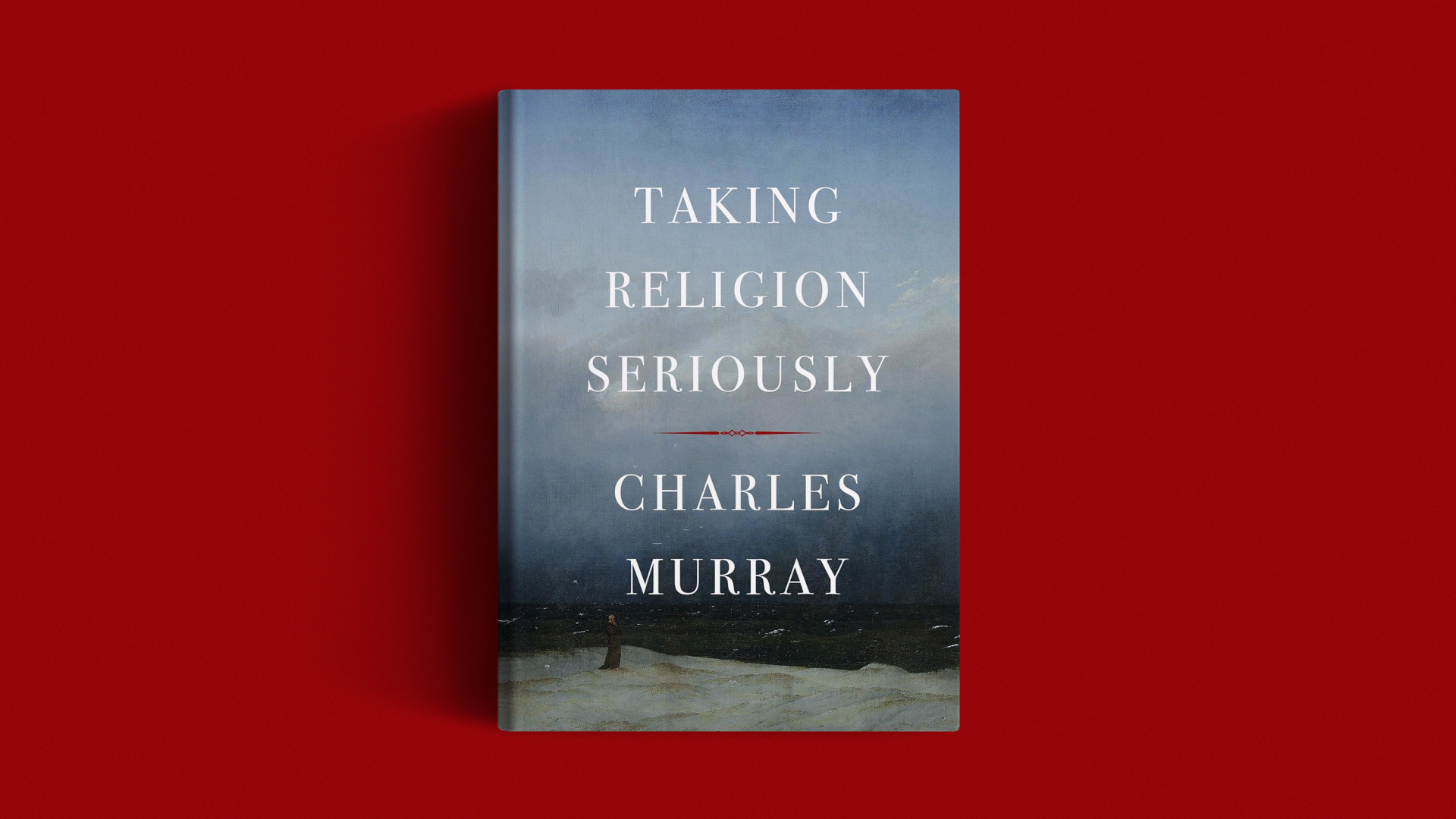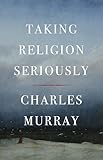What does the search for faith look like through the eyes of an agnostic? Christians can sometimes make assumptions from the outside about what that process looks like, but a new book by libertarian political scientist Charles Murray offers personal insight. His book, Taking Religion Seriously, is a part of a trend of public intellectuals such as former New Atheist Ayaan Hirsi Ali and journalist Molly Worthen, embracing personal faith.
Although Murray’s work has publicly recognized the importance of religion to society, he previously identified as agnostic. His latest contribution is a departure both in its personal dimension (the only book remotely similar is his little advice volume The Curmudgeon’s Guide to Getting Ahead) and in its length, readable over a weekend at 158 pages.
He documents his arrival at faith, which was sparked by his wife Catherine’s interest in religion and grew to a personal intellectual pilgrimage. Murray draws on the apologetic and testimony genres, although he frustrates the expectations of both. His goal is to convince the reader that asking questions about faith, rather than advancing a specific set of conclusions, is a crucial task in life. The book challenges the assumption that we can separate the public good of religion from personal faith. If religious practice is necessary for a thriving society, then it’s necessary for a thriving soul as well.
Though Murray explores classic arguments for the existence of God, such as the unmoved mover and fine-tuning, he approaches them with a refreshing intellectual humility. For example, he considers C. S. Lewis’s moral argument for God’s existence in Mere Christianity, an argument which contends that the consistency of moral teaching across cultures provides evidence for an eternal moral source.
This argument was crucial for Murray in the jump between belief in the existence of God and belief in an active God who requires something of each person. Perhaps, he admits, he was already predisposed to accept this argument since he had been moving toward this perspective. Nonetheless, he has come to see God as the best explanation for the phenomenon of universal moral knowledge. The moral argument has persuaded generations of seekers and Christians, and the glimpse into Murray’s own thought process is valuable. The future reading lists he provides in each chapter on their own are worth the price of the book.
Murray examines several areas that are controversial even to some very pious Christians, such as terminal lucidity, where someone close to death experiences remarkable clarity. Referencing documented examples, he argues this challenges a strictly materialist vision of consciousness:
One of the tribes to which I belong is the tribe of smart people. For me to accept the evidence regarding terminal lucidity and near-death experiences (and to publish!) will lower other members’ opinions of me, including the opinions of many people whom I admire and whose good opinion I value. I don’t want to be thought credulous and foolish and get kicked out of the tribe.
But he continues to poke at this impulse: “If you find yourself reluctant to give up strict materialism for similar reasons, try to get over it.” The topic is simply too important to gloss over. Humility paradoxically makes many of his arguments more persuasive because he honestly grapples with whether nonmaterialism is defensible.
Murray’s personal journey sheds light on questions he raised in previous books. In Coming Apart, Murray chronicles the way in which the US is divided between two social classes—the wealthy elite, who have strong family formation, church attendance, and community health, and the disillusioned poor, who have weakening community, church, and family ties. Data consistently shows that religious participation is necessary to thriving communities, so the trend of lower participation among the poor is especially concerning. His proposed solution at that point was what he called a “civic Great Awakening,” by which he meant a nonreligious awakening of civic engagement.
Murray’s story implicitly rejects the narrative of self-proclaimed cultural Christians, such as Tom Holland or Jordan Peterson, to whom Christianity carries a certain poetic truth that drives civilization whether or not it is literally true. If we have a high view of truth, can we tolerate a noble lie on a societal level? Won’t that approach erode truth in other aspects of life? The societal quest for meaning must have as its source the individual’s search for truth and ultimately, faith. The trend of young people, particularly young men, attending church at higher rates than older generations, could be a large scale move toward faith. Are we at the cusp of a major societal shift?
That solution seemed inadequate when I first encountered the book, and I recall challenging Murray on it when I met him while I was a student at Grove City College. How can you have an awakening without the source of that awakening, the quickening of hearts toward God? I suspect that solution is now less convincing to Murray.
Whether this book can be read as a testimony is a complex question. Murray does indeed have the classic “before, change, after” formula of a testimony. As a strict materialist, he had rejected things of faith simply because people told him that was the only intellectually honest position.
Then, “as a series of nudges spread over many years,” he questioned his own presuppositions and eventually acknowledged the existence of God, the historical accuracy of the Christian Scripture, and the moral claims of Jesus. Afterward, he documented the changes in his life, including, most notably, his accepting the forgiveness of sins, saying, “God’s grace has become real to me.” Even invoking the word sin, he acknowledges, is a significant departure.
Still, the experiential aspect of faith is an enigma to Murray. He ends the book with a striking analogy that could be right at home in a Lewis volume:
I have yet to experience the joys of faith. When I’m around Catherine and others who have, I sometimes feel like a little boy whose nose is pressed against the window, watching a party he can’t attend. I’m not done trying to join the party. Perhaps the door will open eventually.
Intentionally or not, the picture draws to mind two famous passages of Scripture. First, “Let the little children come to me, and do not hinder them, for the kingdom of heaven belongs to such as these” (Matt. 19:14). Here Jesus strongly affirms the simple faith of a child, one who may be gazing longingly into that brightly lit room but asks earnest questions. Given Murray’s tenure and status as a think tank leader, this metaphor is somewhat surprising and beautiful.
Earlier in the Gospel, Jesus says, “Ask and it will be given to you; seek and you will find; knock and the door will be opened to you. For everyone who asks receives; the one who seeks finds; and to the one who knocks, the door will be opened” (Matt. 7:7–8). This is a powerful promise to those who are genuinely seeking answers to life’s most vital spiritual questions.
In Confessions, Augustine discusses his conversion at two or three different moments. Centuries of readers have asked, “Which one is the real conversion?” Given the persistence of faith, the answer must be that both are genuine and that the true pattern of a Christian’s life is a continual movement toward the divine.
I would somewhat temper Murray’s feeling of being outside the room of faith. While he claims to have had no emotional experience, he has experienced remarkable changes. Before discovering faith, he considered suicide at the end of life as the best option. Now he is “untroubled by the prospect of death.” Is not that change itself an experience?
Murray has found a type of faith, if not a road to Damascus. And while he is no orthodox Christian by the end of his book, the process of weighing the evidence and searching for truth has led him in a new direction. That open approach to questioning is representative of the Quaker meetings where he and Catherine have attended for decades. His approach is similar to the entrepreneurial “build in public” model that lets the readers into an ongoing process.
Søren Kierkegaard addresses those who are stuck in the purely objective search for truth in Concluding Unscientific Postscript. He sends up the philosopher who “just two weeks before his death … is looking forward to a new publication” to see if it might prove or disprove his beliefs. Murray in several ways typifies Kierkegaard’s objective philosopher who is paralyzed by the need to rationally prove every point and subpoint.
The leap of faith is Kierkegaard’s answer to this paralysis—an acceptance of that which we do not fully understand. He views this not as a rejection of reason but as a proper ordering of reason within the infinite paradox of faith. In the tradition of Augustine, Anselm of Canterbury states, “Credo ut intelligam” (“I believe in order to understand”). The leap (or more properly translated “spring”) of faith enlightens the rest of life.
In a refreshing way, Murray’s addition to the conversation connects the theoretical discussion around the importance of religion in society, which he was already a part of, with the personal journey of faith. Perhaps this book will inspire more people to knock at the door of that brightly lit room of faith.
Noah C. Gould is the alumni and student programs manager at the Acton Institute and a contributor at Young Voices.















